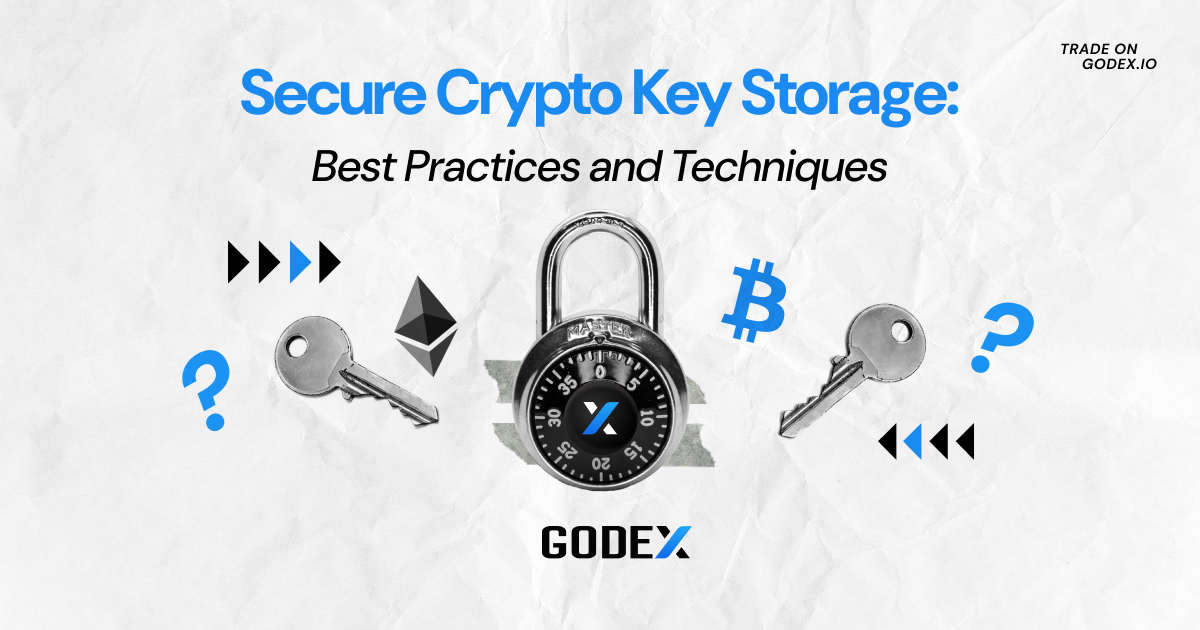Table of Contents
Unlike traditional money, crypto coins do not have a physical form. A digital wallet stores not the asset (it is in the blockchain), but codes for interaction with a decentralized registry. Cryptographic methods are used to secure the funds reliably. When a digital address is created, a code is generated, it will be required to identify the owner and conduct operations. In the article, we will tell you what a private key in a cryptocurrency wallet is and why you need to be responsible for its storage.
Understanding Private Keys in the Crypto World
Cryptocurrency operations involve encryption with a public and private key. The public key is for encryption, while the private key is for decryption and should be kept secret. The keys work together for wallet security and functionality. Private keys are unique alphanumeric codes serving as passwords or digital signatures, crucial for accessing cryptocurrency assets. A popular expression in crypto-space is “not your keys, not your money”. Only the owner should have access to the closed codes. This ensures that the investor can dispose of the account in any situation.
Exploring Different Storage Options for Private Keys
Where to store private keys?
1. Hardware Wallets: Fortifying Your Digital Fortress
A hardware wallet is a small physical unit (often similar to a regular thumb drive) aimed at providing crypto key storage offline, i.e. “cold” storage and use of funds in an online mode for virtual coin transaction performances. Unlike regular wallets where we store fiat (physical) money, a hardware cryptocurrency wallet is not designed to store coins, it contains the user’s private keys, which are required to access the coins and the blockchain platform. Most hardware wallets can handle multiple blockchains. Thus, a user only needs one device to manage different types of assets on various exchanges. If data stored in a hardware wallet is lost, only one phrase or PIN is needed to recover it.
2. Paper Wallets: A Time-Tested Offline Solution
Originally popular in the early days of cryptocurrency, circa 2013 and 2014, paper wallets are essentially physical printouts of your private keys, often encoded in QR codes. This method effectively keeps your keys offline, but paper wallets are vulnerable to physical damage or loss. What’s more, they lack secret recovery phrases, making key recovery impossible. To transfer assets from a paper wallet, you need to import them into a software wallet, which can lead to your keys being exposed online. In the event of loss or theft, a paper wallet gives you unlimited access to your funds. While cost-effective, the complexity of securely managing paper wallets makes them less attractive with the advent of more user-friendly cold wallet options.
3. Encrypted USB Drives: Portable Security for Your Keys
The secret combination can be copied and pasted into a text file or Excel spreadsheet. This option is less reliable but convenient. Often crypto enthusiasts have multiple wallets: separate ones for long-term investments, trading, staking, lending, and airdrops. Users earning from multi-accounts can open 100-200 accounts. For security, it is recommended to encrypt the file (e.g. archive with a password) and place it on a separate USB stick. The disadvantage of such devices is the possibility of data corruption and theft if you connect to a compromised device. In this case, it is advisable to make multiple backups.
4. Cold Storage: Keeping Keys Offline for Ultimate Safety
Cold storage wallets are particularly effective in safeguarding cryptocurrency by securely storing private keys offline, effectively shielding against cyber threats like hacking and malware compared to online or hot wallets. Nonetheless, this increased security does come with a trade-off in terms of convenience, as cold wallets may present challenges to users, particularly those new to the technology, due to their offline features. It underscores the importance of maintaining backups of your private key to prevent loss or damage to your cold wallet and ensure continuous access to your cryptocurrency holdings.
5. Cryptocurrency Vaults: Enhanced Protection for High-Value Assets
A sustainable coin wallet is the best way to keep your hard-earned digital currency safe from hackers. Cryptocurrency wallets are divided into two main groups: “hot” and “cold”. “Hot” cryptocurrency wallets are completely virtual, and usually offered by the cryptocurrency exchanges themselves. They are inexpensive, suitable for quick transactions, and more convenient to use, especially for novice cryptocurrency fans. However, due to their digital nature, such wallets are much more vulnerable to malicious online activity and cybercriminals in general. This is why many cryptocurrency owners opt for “cold” wallets. A “Cold” wallet is a physical device that is designed to securely store coins without an internet connection. Such wallets contain PINs and private cryptographic keys to access the blockchain via a so-called “blockchain bridge” and come in different formats.
6. Password Managers: Balancing Convenience and Security
The best and most secure way to store cryptocurrency private keys, passwords, and mnemonic phrases is with a password manager. A password manager like LastPass and Dashlane encrypts all data, making it a secure option for storing the information you need to access cryptocurrency without it falling into the wrong hands. The password manager will help you avoid losing your private keys and losing access to large sums of money, giving you absolute peace of mind.
7. Splitting the Key: An Extra Layer of Protection
This method involves splitting the private key into several parts and distributing them in different secure locations. An example is Shamir’s Secret Sharing (SSS) method, which divides a user’s key into “n” parts requiring a minimum of “m” parts to recover the key.
The SSS algorithm works by splitting the secret into multiple parts, each of which is useless by itself. To recover and retrieve the secret, a certain number of shares must be combined, which will suffice.
In the context of seed-phrase storage, SSS opens up the possibility of encrypting the information and then splitting the secret into parts. In theory, this allows storing the Bitcoin wallet key more securely. Or, for example, to distribute the secret among trusted individuals. In this case, each individual will not be able to access the funds independently. An example of the implementation of the scheme is individual hardware cryptocurrency wallets with the implemented Shamir Backup function. In particular, there are some devices from Trezor. But we note that the solution may not be suitable for everyone.
Innovative Approaches to Crypto Key Storage
In today’s rapidly evolving digital landscape, the security of cryptographic keys is paramount in safeguarding sensitive information and transactions. As cyber threats become more sophisticated, the need for innovative approaches to crypto key storage has never been more pressing.
Traditional methods of storing cryptographic keys, such as on physical hardware or in software systems, have proven to be vulnerable to attacks. This has led to the development of cutting-edge solutions that leverage advanced technologies like secure enclaves, multi-party computation, and homomorphic encryption.
By exploring these innovative approaches, organizations can enhance the confidentiality and integrity of their cryptographic keys, ensuring that only authorized users can access and utilize them securely.
Security Measures for Crypto Key Storage
To safeguard cryptographic keys:
- Encrypt keys for added security
- Use Hardware Security Modules (HSMs) for key safekeeping
- Establish robust key management policies
- Implement multi-factor authentication
- Conduct regular auditing and monitoring to identify unauthorized access promptly.
If you don’t want to store your private key on paper, it is advisable to store text files with keys in unremarkable files with the same name such as system files. You can also write the key to a code file and add it to your program folder. You might consider storing text keys in game files or with your study materials. You can archive important files in a WinRAR archive and give it a password.
Conclusion
How to store private keys securely? Managing and securing cryptocurrencies can be a daunting task not only for beginners but also for advanced experts. You bear sole responsibility for keeping your digital assets safe and sure.
By applying advanced security measures, you can significantly reduce the risks of losing or disclosing your private keys. In the ever-evolving Web3 space, it is crucial to be aware of potential security threats and implement innovative strategies to protect your assets. Remember, the security of your cryptocurrencies is entirely in your hands, and prioritizing the security of your private keys is vital to protecting your digital wealth.
FAQ
How Do I Safely Store a Private Key?
Best practices include storing private keys offline (cold storage) in hardware wallets or on secure physical media, using strong password protection, and considering multi-signature authentication for additional security. Users should avoid sharing or storing private keys in easily accessible digital formats to minimize the risk of potential tampering or theft.
Is Storing Private Keys in a Database Safe?
To safeguard private keys against potential hacking risks, data breaches, or unauthorized intrusions, it is advisable not to store them in a database. As soon as a user allows the key to be transferred to the database, the key can be considered compromised.
Where Should Private Key Certificates Be Stored?
Secret key certificates should be safely kept in cold repository solutions like hardware or paper cryptocurrency vaults to bolster safeguards and prevent system breaking. Private key storage off-web mitigates the risk of hacking or a heist.
Start a Cryptocurrency exchange
Try our crypto exchange platform
Disclaimer: Please keep in mind that the content of this article is not financial or investing advice. The information provided is the author’s opinion only and should not be considered as direct recommendations for trading or investment. Any article reader or website visitor should consider multiple viewpoints and become familiar with all local regulations before cryptocurrency investment. We do not make any warranties about reliability and accuracy of this information.
 Peter Moore
Peter Moore 
Read more
Ripple (XRP) price has been widely discussed by the cryptocurrency community since it has gained public interest in 2017, even though it was founded by Chris Larsen and Jed McCaleb years before. The platform offers innovative blockchain solutions for the banking sector and has the potential to disrupt the whole finance industry. In recent years, […]
In this article we will talk about Ripple (XRP) and its price prediction. What is Ripple (XRP) Ripple is a San Francisco-based startup that was launched in 2012 by Ripple Labs as a global network both for cross-currency and gross payments. Ripple history began in 2004 with the discussions around the digital coin in the […]
You may well think that an article dedicated to a Tether price prediction or the Tether price in general is a little bit strange — it is a stablecoin after all. However, the price of Tether does fluctuate significantly, although it is nowhere near as volatile as non-stablecoin cryptos. This means that staying up to […]
In the article we share our vision at Zcash cryptocurrency main features and add several price predictions. As cryptocurrencies gain global acceptance and decentralisation slowly enters our lives, privacy becomes the main concern when talking about blockchain adoption. It is no secret that distributed ledger is by far the most secure and transparent technology ever […]
Chiliz coin (CHZ) offers a compelling opportunity for traders interested in the intersection of blockchain technology and sports. By enabling fans to influence team decisions through the Socios app, Chiliz directly monetizes fan engagement and connects with major sports teams like Juventus and Paris Saint-Germain. These partnerships not only enhance the platform’s visibility but also […]
The exponential growth of Bitcoin Satoshi Vision (BSV) against the general bear trend on the cryptocurrency market in autumn 2019 has impressed the community. Due to the increasing market capitalization, the newly emerged altcoin was ranked 5th on CoinMarketCap and managed to maintain its high position at the beginning of 2020. In the article we […]